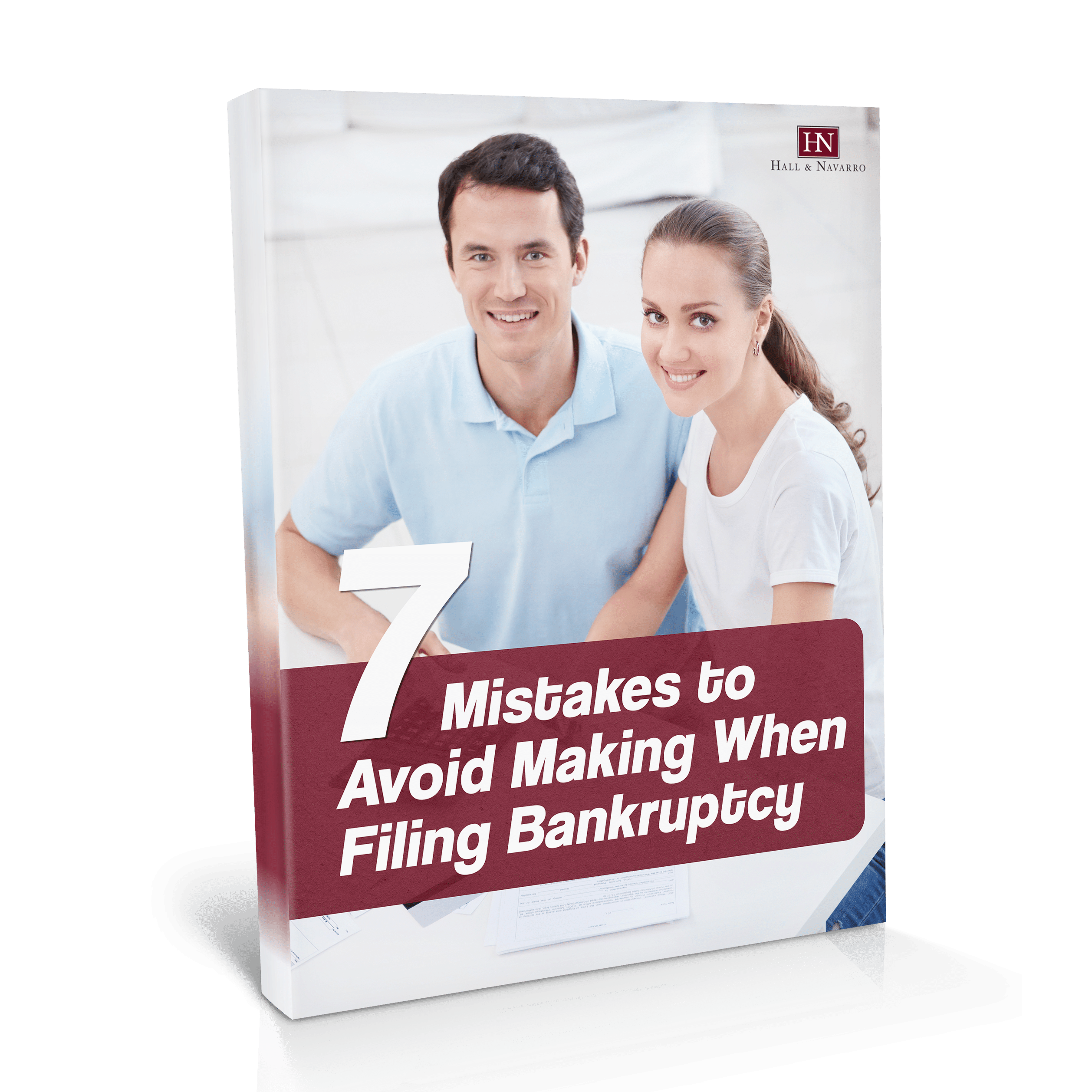Chapter 7 Bankruptcy
Georgia Chapter 7 Bankruptcy Lawyers
Breathe Easy with Trusted Bankruptcy Attorneys.
Are you struggling with overwhelming debt? Filing for bankruptcy can be a fresh start, and our Georgia Chapter 7 Bankruptcy Lawyers at Hall & Navarro are here to guide you through the process. Whether you’re facing collection calls, wage garnishments, or mounting bills, we can help you explore your options and determine if Chapter 7 bankruptcy is the right path forward.
Let our family handle your family’s needs. It’s time to end the collection calls and past-due letters. Call the Georgia bankruptcy lawyers at Hall & Navarro today to get started.

Want to learn more?
Watch this video.
Considering bankruptcy?
Download our free guide.
There are 7 mistakes you should avoid when filing bankruptcy.

Top Rated Family Lawyers in Georgia
Over 100 5-star reviews on google









How is Hall & Navarro different?
Prepared to Win
No matter what, we approach every case prepared to win. This has been our driving force from day one, and still carries us forward today.
Breadth of Experience
With more than 75 years of combined experience in a variety of practice areas, we are frontrunners of law in Southeast Georgia.
Fearless representation
We put everything forward, and take nothing back. We are a united front, rallying behind and in front of every client.
How Chapter 7 Bankruptcy Works
Chapter 7 bankruptcy, also known as “liquidation bankruptcy,” helps individuals and families eliminate unsecured debt, such as:
- Credit card debt
- Medical bills
- Personal loans
- Certain overdue taxes
With Chapter 7, many filers can discharge debts while keeping essential assets, thanks to exemptions under Georgia law. Our experienced Georgia Chapter 7 Bankruptcy Lawyers will review your financial situation and ensure you understand what debts can be discharged and what assets are protected.
What to Expect When Filing for Chapter 7
If you’re considering Chapter 7 bankruptcy, here’s what you need to know:
- Credit Counseling Requirement – You must complete a court-approved credit counseling course within six months before filing.
- Filing Your Petition – We will help you prepare and file the necessary legal documents to initiate your bankruptcy case. Be prepared to share your personal information including all your debts, assets, income, and typical expenses.
- Automatic Stay Protection – Once filed, debt collectors must immediately stop contacting you, and foreclosure actions are stopped.
- Bankruptcy Trustee Assignment – A court-appointed trustee will review your financials and oversee the process.
With Hall & Navarro’s Georgia Chapter 7 Bankruptcy Lawyers on your side, you can navigate this process confidently, knowing every step is handled with care.
Potential Challenges of Chapter 7 Bankruptcy
While Chapter 7 provides significant debt relief, it may not be the right solution for everyone. Some considerations include:
- Asset Liquidation – Certain non-exempt assets may be sold to pay creditors.
- Secured Debts – If you wish to keep assets like your home or car, you must stay current on payments.
- Eligibility Requirements – Income limits apply to qualify for Chapter 7 bankruptcy.
If Chapter 7 isn’t the best fit, we can help you explore Chapter 13 bankruptcy or other debt relief solutions. Our Georgia Chapter 7 Bankruptcy Lawyers are committed to finding the right path for your financial future.
Take the First Step Toward a Debt-Free Future
Don’t let debt control your life any longer. At Hall & Navarro, our compassionate and skilled Georgia Chapter 7 Bankruptcy Lawyers are ready to help you regain financial freedom. Contact us today for a consultation and take the first step toward a fresh start.
Schedule your consultation.
Speak with one of our dedicated team members by filling out the form below.
More Chapter 7 Info
What You Need in Order to File for Chapter 7 Bankruptcy
When filing any bankruptcy, your income is going to be a factor. There are specific guidelines for income and expenses allowed for individuals filing a Chapter 7 bankruptcy. If you make under a certain amount, you automatically qualify for Chapter 7. If you are above a certain threshold as governed by Georgia’s allowances, you will have to complete a “Means Test” to determine your eligibility. The idea is that the court is trying to determine how much you have left over after you paid your monthly expenses. It may turn out that you are not eligible for bankruptcy because of your debt-to-income ratio.
The Benefits of a Chapter 7 Bankruptcy
A Chapter 7 bankruptcy liquidates or eliminates all unsecured debt such as credit cards, personal bills, medical bills, delinquent rent, things like that. Now, if you’re going to keep your car, your house, or your apartment, of course, you have to keep the current payments made. It doesn’t discharge any debts that are current after the filing of a bankruptcy.
Say, for instance, you were in an automobile wreck and you have a lot of medical bills. Those medical bills are now in collection. A Chapter 7 would discharge those medical bills many times.
What assets can be protected under a chapter 7 bankruptcy?
One of the primary questions that our clients ask us is what assets are protected in a Chapter 7 bankruptcy in Georgia. There’s a term called exempt assets. It’s a term that attorneys use that most people would never use in their ordinary language. Exempt assets are basically assets that the state of Georgia has determined that, no matter what happens, you can protect these assets from your creditors.
Georgia has established a particular bankruptcy statute that lines out those assets. For instance, you can protect up to:
- $1,500 of equity in your house
- $5,000 of equity in an automobile
- $2,000 equity if you cash your regular life insurance policy
- $1,200 in tools of the trade
- $1,200 in other assets that you might have.
There’s a smattering of other type of protections. One of the big protections is retirement plans. You can always protect unlimited amounts of monies in retirement plans that are tax-exempt, for instance, 401(k), your employee provided retirement plan. IRAs and other types of retirement plans are always fully protected.
If you have any questions concerning what assets are protected and what assets are not protected, you can give our office a call. We can send you a complete itemization sheet exactly from the Georgia code.
Who is not eligible for a chapter 7 discharge in Georgia?
We often get asked who is eligible or not eligible to file a Chapter 7 bankruptcy in Georgia. With the change in the law in 2005, eligibility for Chapter 7 bankruptcies shifted somewhat. You can not file a Chapter 7 bankruptcy in Georgia, if:
- You filed a Chapter 7 within the past eight years.
- You filed a Chapter 13 within the past six years.
- You dismissed a bankruptcy in the past 180 days.
One other issue that you have to always be concerned with is what they call the means test. Georgia, as well as every other state, have certain criteria which allow people and size of families in set income limits and who cannot file a Chapter 7 bankruptcy. If you’re single, the limit is set at one figure. If you’re a family of five, then your figure is at a different number. You have to run through a computerized program on means testing to determine whether or not you are eligible for filing the Chapter 7. It’s not very complicated, but it is an absolute requirement for the filing of Chapter 7.
